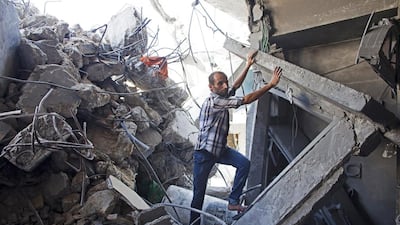JERUSALEM // Israel’s “unlawful policy” of launching airstrikes on Palestinian homes killed hundreds of civilians during last year’s Gaza war, said an Israeli rights group on Wednesday.
In a report examining 70 raids on residential buildings in the besieged Palestinian territory, B’Tselem said Israeli officials were responsible for civilian casualties during the 50-day conflict that killed nearly 2,200 Palestinians.
“A hallmark of the fighting in Gaza this summer was the numerous strikes on residential buildings, destroying them while their occupants were still inside,” the 49-page report said.
“These attacks were not carried out on the whim of individual soldiers, pilots or commanders in the field. They are the result of a policy formulated by government officials and the senior military command,” it said.
In the cases B’Tselem investigated, 606 people were killed, 70 per cent of whom were women, minors or the elderly.
The United Nations says civilians made up almost 70 per cent of the conflict’s Palestinian death toll.
The July-August conflict also killed 67 soldiers and six civilians from Israel.
By Tuesday, B’Tselem had not yet received a response from Prime Minister Benjamin Netanyahu’s office regarding the report, but the army rejected its allegations.
The group questioned Israel’s claims that it went out of its way during the conflict to respect international humanitarian law.
“You cannot say that the army didn’t know or couldn’t know how many civilians would get killed during those attacks,” B’Tselem’s head of research Yael Stein said.
“You can’t maybe [know] on the first day or the second day. But on the 10th day or the 20th day, when you see how many civilians are getting killed ... these attacks shouldn’t have happened,” she said.
B’Tselem demanded explanations for possible Israeli violations of international law – specifically in deciding whether a home constituted a legitimate military target, and whether its destruction gave a distinct military advantage outweighing collateral damage.
The army insisted it only hit legitimate military targets and blamed Gaza’s Islamist rulers Hamas for civilian casualties.
“The IDF [Israel Defence Forces] does not attack residential buildings,” it said in a statement.
“Attacks during the operation were only directed at residential buildings where they became legitimate military targets, or when a person constituting a legitimate military target was in the structure.
“The high number of ostensibly residential structures attacked point not to an illegal punitive policy of the IDF but rather to the widespread and systematic unlawful use made of such structures by the terror organisations in Gaza.”
Ms Stein said that “even if there was somebody from Hamas in the house ... the numbers of civilians killed in each incident is so high that it’s not a matter of whether it was a legitimate military target or not.”
She said more residential buildings had been bombed during this campaign than during the Gaza war in 2008-2009, the second deadliest after last summer’s war. In that conflict, she said, most of the cases were explained by the military.
The report criticised what it said were attempts to shirk responsibility for civilian deaths by solely blaming Hamas.
“It is true that Hamas and other organisations operating in the Gaza Strip do not abide by international humanitarian law,” the report said, referring to rocket fire at Israeli cities from densely populated civilian areas inside Gaza.
But insistence that Hamas was to blame for all civilian deaths in Gaza was an attempt to place “no restrictions whatsoever on Israeli action ... no matter how horrifying the consequences,” it said.
“This policy is unlawful through and through.”
* Agence France-Presse

